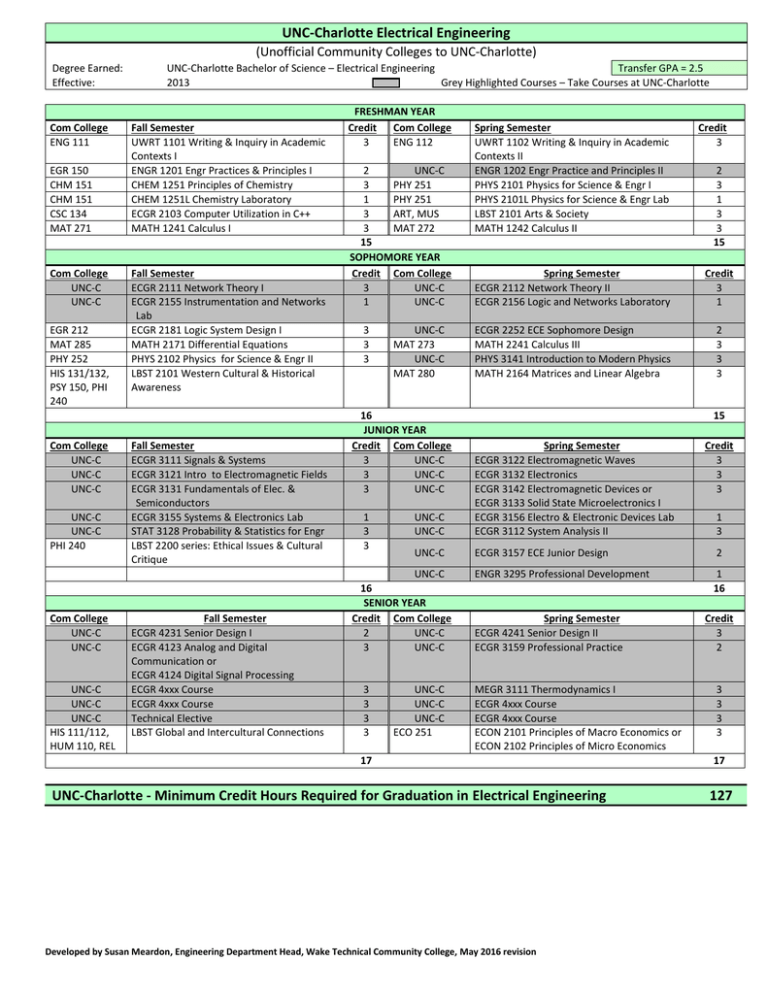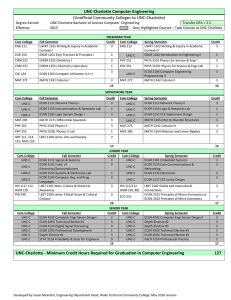UNC-Charlotte Electrical Engineering UNC-Charlotte
advertisement

UNC-Charlotte Electrical Engineering (Unofficial Community Colleges to UNC-Charlotte) Degree Earned: Effective: Com College ENG 111 EGR 150 CHM 151 CHM 151 CSC 134 MAT 271 Com College UNC-C UNC-C EGR 212 MAT 285 PHY 252 HIS 131/132, PSY 150, PHI 240 Com College UNC-C UNC-C UNC-C UNC-C UNC-C PHI 240 Com College UNC-C UNC-C UNC-C UNC-C UNC-C HIS 111/112, HUM 110, REL UNC-Charlotte Bachelor of Science – Electrical Engineering Transfer GPA = 2.5 2013 Grey Highlighted Courses – Take Courses at UNC-Charlotte Fall Semester UWRT 1101 Writing & Inquiry in Academic Contexts I ENGR 1201 Engr Practices & Principles I CHEM 1251 Principles of Chemistry CHEM 1251L Chemistry Laboratory ECGR 2103 Computer Utilization in C++ MATH 1241 Calculus I Fall Semester ECGR 2111 Network Theory I ECGR 2155 Instrumentation and Networks Lab ECGR 2181 Logic System Design I MATH 2171 Differential Equations PHYS 2102 Physics for Science & Engr II LBST 2101 Western Cultural & Historical Awareness Fall Semester ECGR 3111 Signals & Systems ECGR 3121 Intro to Electromagnetic Fields ECGR 3131 Fundamentals of Elec. & Semiconductors ECGR 3155 Systems & Electronics Lab STAT 3128 Probability & Statistics for Engr LBST 2200 series: Ethical Issues & Cultural Critique Fall Semester ECGR 4231 Senior Design I ECGR 4123 Analog and Digital Communication or ECGR 4124 Digital Signal Processing ECGR 4xxx Course ECGR 4xxx Course Technical Elective LBST Global and Intercultural Connections FRESHMAN YEAR Credit Com College 3 ENG 112 2 UNC-C 3 PHY 251 1 PHY 251 3 ART, MUS 3 MAT 272 15 SOPHOMORE YEAR Credit Com College 3 UNC-C 1 UNC-C 3 3 3 UNC-C MAT 273 UNC-C MAT 280 16 JUNIOR YEAR Credit Com College 3 UNC-C 3 UNC-C 3 UNC-C 1 3 3 Credit 3 2 3 1 3 3 15 Spring Semester ECGR 2112 Network Theory II ECGR 2156 Logic and Networks Laboratory Credit 3 1 ECGR 2252 ECE Sophomore Design MATH 2241 Calculus III PHYS 3141 Introduction to Modern Physics MATH 2164 Matrices and Linear Algebra 2 3 3 3 15 UNC-C UNC-C Spring Semester ECGR 3122 Electromagnetic Waves ECGR 3132 Electronics ECGR 3142 Electromagnetic Devices or ECGR 3133 Solid State Microelectronics I ECGR 3156 Electro & Electronic Devices Lab ECGR 3112 System Analysis II UNC-C ECGR 3157 ECE Junior Design 2 ENGR 3295 Professional Development 1 16 UNC-C 16 SENIOR YEAR Credit Com College 2 UNC-C 3 UNC-C 3 3 3 3 Spring Semester UWRT 1102 Writing & Inquiry in Academic Contexts II ENGR 1202 Engr Practice and Principles II PHYS 2101 Physics for Science & Engr I PHYS 2101L Physics for Science & Engr Lab LBST 2101 Arts & Society MATH 1242 Calculus II UNC-C UNC-C UNC-C ECO 251 Spring Semester ECGR 4241 Senior Design II ECGR 3159 Professional Practice MEGR 3111 Thermodynamics I ECGR 4xxx Course ECGR 4xxx Course ECON 2101 Principles of Macro Economics or ECON 2102 Principles of Micro Economics 17 UNC-Charlotte - Minimum Credit Hours Required for Graduation in Electrical Engineering Developed by Susan Meardon, Engineering Department Head, Wake Technical Community College, May 2016 revision Credit 3 3 3 1 3 Credit 3 2 3 3 3 3 17 127 UNC-Charlotte Electrical Engineering (continued) (Unofficial Community Colleges to UNC-Charlotte) The B.S.E.E. academic plan of study requires fifteen (15) hours. Twelve (12) hours of these technical electives must be chosen from 4000 level ECGR courses while the remaining three (3) may be chosen from any 3000 level and higher ECGR courses that are not part of the degree requirements, or non-ECGR course dealing with engineering science, analysis, synthesis, or design. Individual study courses may not be taken as technical electives. Co-op students may count up to three (3) hours of ECGR 3695 co-op course toward their technical elective requirements. Limit of One outside of the department. Consistent with the student’s educational objectives and in consultation with academic advisor, up to three (3) hours of the technical electives may be taken outside the ECE Department. The following process should be followed in selecting this non-ECGR technical elective course: 1. A 3-hour 3000-level or above course that is consistent with the student’s educational objectives, and is more advanced than similar courses that are required by the student’s academic plan of study, should be selected by the student and approved by his/her academic advisor and the Department Associate Chair. 2. The student must seek the approval of his/her advisor and the Associate Chair before taking the course. 3. In cases when a student request transfer credits for the non-ECGR technical elective, the Department Associate Chair will evaluate the request to determine whether or not the requested transfer credit is consistent with the requirements in #1. Developed by Susan Meardon, Engineering Department Head, Wake Technical Community College, May 2016 revision


